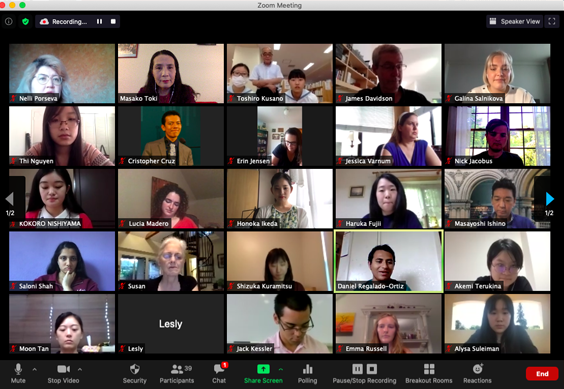July 10, 2020
Masako Toki
On June 25, the Critical Issues Forum (CIF) alumni and teachers gathered online to share their experience with CIF, their goals and dreams, and how CIF has influenced their career path.
The CIF project is one of CNS’s flagship projects that aims to promote disarmament and nonproliferation education for high school students and teachers around the world for a safer and more peaceful future.

The COVID-19 quarantine upended almost all of our plans for the year. The spring CIF students conference was no exception. In response, we rapidly enhanced the online communication among CIF participants and alumni as a way to strengthen the network of young people committed to nuclear disarmament and nonproliferation.
Although virtual events cannot fully replace face-to-face events, the need to shift our modus operandi into a virtual format helped spawn the idea to host a wider, CIF alumni meeting, the first of its kind. In this way, adversity proved to be an opportunity. In total, more than 40 alumni students and teachers from Japan, Russia, and around the United States joined the meeting.
All of us, students and teachers alike, have been navigating the multifaceted uncertainties caused by the global pandemic. In addition, we are witnessing the further deterioration of international relations and its detrimental effect on nuclear arms control. Amidst all these challenges, one thing has remained constant, and indeed proven to be of utmost importance: the role of youth education for a more secure and safer world.
A Gathering of Motivated Alumni
After a brief introduction by CIF Project Manager Masako Toki, CNS Deputy Director Jessica Varnum warmly welcomed the participants by emphasizing the importance of nonproliferation and disarmament education for high school students, and expressed her appreciation to high school teachers.
Ms. Sarah Pattison, who has been supporting CNS nonproliferation activities for young generations over a decade, also joined the event. In addition, representatives of the United Nations Office for Disarmament Affairs and Hiroshima Prefecture observed the meeting.
Student alumni expressed how much they enjoyed their CIF experience, how the project influenced their career path, their college majors, and their way of seeing the world. They also shared their current activities in the field of nuclear disarmament and nonproliferation and their future goals and plans.
A number of CIF alumni joined the CTBTO Youth Group, and remain actively working in the field. They also shared their thoughts on young generation’s role to get rid of nuclear weapons and their risks.
While we all understand the current COVID 19 crisis is a serious global challenge, so, too, are nuclear threats, and many alumni agreed that it is important to raise awareness of nuclear dangers among young generations. One alumna passionately asserted: “…one of the biggest challenges facing our generation is complacency…We need to drill in the mindset of the youth that we have been lucky that we have been able to avoid nuclear war but we need to educate them on nuclear nonproliferation and nuclear disarmament and engage them in talks on peace and security. Youth awareness is a critical component of nuclear abolition.”
The CIF project has had a multitude of effects on participants. For most of these high school students, CIF was their first opportunity to study nuclear weapons, disarmament, and nonproliferation, and it sparked their interest in the topic.
The project also opened their eyes to the world and developed their cross-cultural understanding.
The alumni testified that meeting students from different countries, learning from students from other countries, and listening to different perspectives on international peace and security significantly contributed to enhance their understanding and interest in global nuclear problems.
As the first person in her family to attend university, one alumna emphasized how significant the CIF experience was for her. With the sustained support from her dedicated teachers, her CIF experience was a driving force in her decision to pursue higher education and work for social justice and world peace.
The alumni also discussed how they stay connected with other alumni using social media.
Teachers’ experience and perspectives were equally inspiring and powerful. One long-time participating teachers, Mr. Andrew King from Los Angeles, expressed how proud he is of his students who are committed to work for world peace, social justice, and for a better world.
One of the most experienced CIF teachers, Ms. Nelli Porseva from Zelenogorsk, Russia, shared her thoughts that both teachers and students have significantly benefitted from CIF. It made both she and her students, she said, feel that they are part of an interconnected world, and it provided a path by which they can feel they can contribute to the making of a better world.
The CIF alumni event was truly inspiring and gave all participants tremendous hope for the better future, especially when things are not so easy under the current circumstances.
Although participants could not meet in person for this year’s CIF, the topic—“Toward a world free of nuclear weapons: the role of youth as change agents”—continues to resonate as we engage in disarmament and nonproliferation education.
Learn more about the Critical Issues Forum (CIF).
See also this relevant article on the Inkstick.
